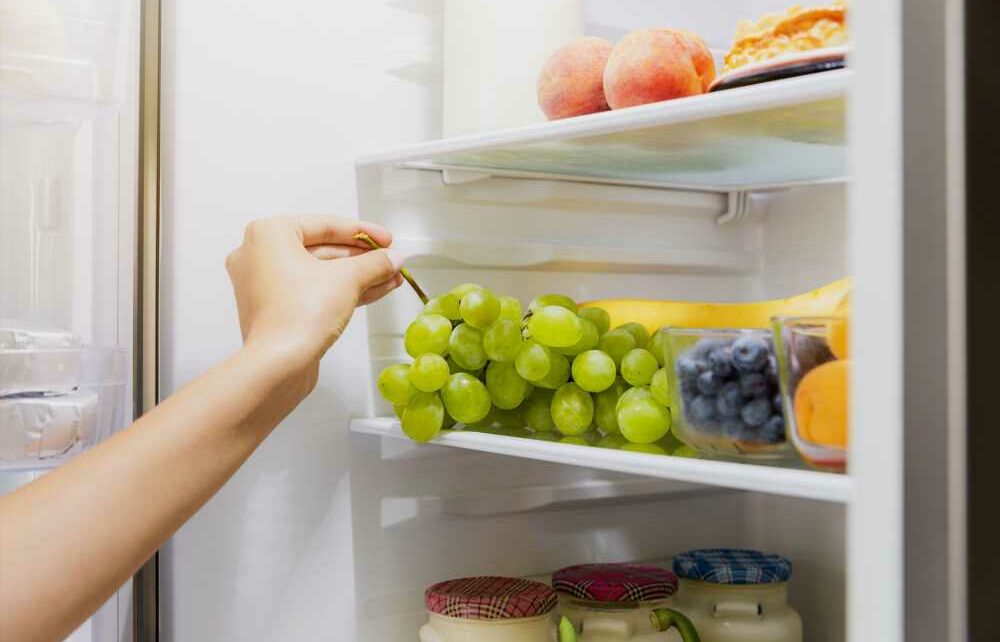IN the summer heat there is nothing more important than making sure one key appliance is operating efficiently… your fridge.
Fresh meat and fruit is important all year round but cold drinks like ice cold water are a necessity this time of year if you want to beat the heat and save cash on your electricity bills.

But what do we really know about fridges?
We’ve spoken to an appliance pro David Palmer, Senior Product Specialist Home Appliances in partnership with LG to learn all the best tips to keep the big beast in good shape and the massive mistakes you're making when it comes to storing food.
The mighty role of the fridge gasket
David says, “The fridge gasket seals the fridge shut and reduces the risk of mould as it keeps the warm air out. However, it’s prone to daily wear and tear so it’s important to clean it regularly and replace it once you notice it becoming brittle.”
David recommends using gentle detergents for the interior cavity to prevent damaging this key component.
“Strong detergents can scratch the interior plastics which can create space for bacteria to grow which you do not want inside your fridge!”
It’s not a big bread bin
Contrary to popular belief, storing bread in the fridge won’t keep it fresh.
David explains: “Starch crystallises faster in cooler environments, so, while your bread might not mould as fast in the fridge, it’s actually likely to become stale faster, your best bet is popping it in the handy freezer next door.”
FABULOUS FIVER: SPEND £5 AND GET A £25 WELCOME BONUS
Fear of filthy filters
David says: “Majority of fridges have air filters to eliminate those unwanted odours. I recommend changing the air filter about every six months to ensure the stench coming from your vintage cheese isn’t wafting throughout the entire fridge. The same goes for the water filter to avoid contamination.”
Most read in Fabulous

I was blindsided when ex Kevin started dating Stacey Dooley, says Strictly's Karen

I ended up in A&E after forgetting to apply sun cream during cloudy weather

My husband died so I got with his brother – trolls say I'm sick but I don't care

B&M shoppers snap up a bargain buy for the garden but it’s causing confusion
Keep it clean
“I suggest cleaning your appliance once a month as it’s a good habit to empty the contents and make sure everything is within its use by date to prevent any lingering bad odours. Also remember to give the water and ice dispenser nozzles a clean.”
Your shelves don’t need a ‘hot bath’
The appliance pro says: “It’s easy to leave your fridge shelves unattended for a while which can lead to a build-up of muck. Wipe them down but do not submerge them in very hot water if they have just been removed from a cold fridge freezer – as while they are tempered glass, the thermal shock may cause them to shatter, which leads to a much more tiresome tidy up!!"
For once, organisation really is “cool”
Similar to not cutting vegetables on the same board as your raw chicken, you shouldn’t store different food groups in the same drawers.
Raw meat, poultry, and seafood should be stored on the bottom shelf of the refrigerator, ideally in a container to protect other items on the shelf from drips.
Fresh, ready-to-eat foods such as fruit and veg should be stored in produce drawers or on shelves above raw meats to prevent the risk of cross-contamination.
Finding the coldest spot
David says: “The back of the bottom shelf is the coolest spot as cold air sinks and it’s the farthest away from the warm air that enters each time the door is open. However, if your fridge has an ice maker, next to the frozen cubes will be the coldest. Pop your meats and cheeses in these areas to preserve their freshness for longer.”
Avoid the warmest spot
David says: “If you’re a fridge gazer, those items in your doors are in the warmest spot since they’re the most susceptible to temperature fluctuations thanks to the constant opening and closing. Instead of storing highly perishable foods like eggs in the doors, stick to keeping condiments, sauces, and fruit preserves that don't require super-cold temps in the door.”
Another one bites the dust
David explains: “That thick layer of dust forming at the base of your fridge can actually shorten its lifespan. Making sure you remove the grill and clean underneath regularly can help your fridge maintain cool temperatures without using too much electricity. The condenser coils keep them free of debris which releases heat and helps the compressor maintain efficiency. Keeping this working well will help with your electricity bills. ”
Don’t be a food hoarder
Overcrowding your fridge with too much food is a recipe for contamination.
Read More on The Sun

I stole my toddler’s clothes and they look amazing – I barely even stretched them

EastEnders’ Jake Wood reveals‘real age’ as he looks nothing like Max
The appliance pro says: “It can block air vents and encourage poor circulation, making cold air harder to reach your food and keep it fresh. Not only that, overcrowding compromises your appliance’s energy-efficiency, so the fridge will require more electricity (and money) to keep it humming.”
“Check to see if everything in there really needs to be, you’ll often find a lot of it doesn’t (this includes tomatoes and your special hot sauce!)”
Source: Read Full Article


